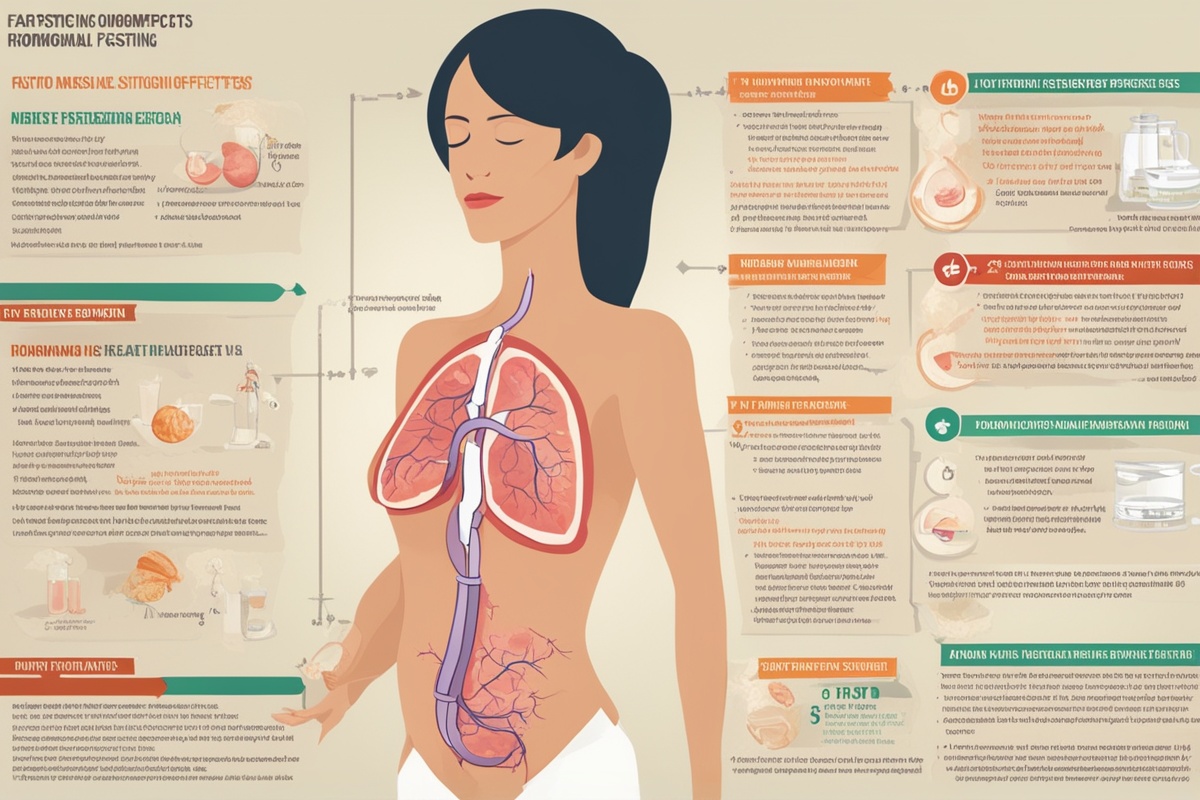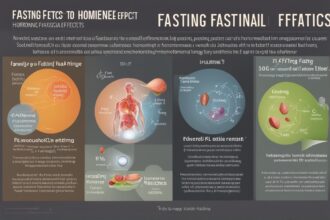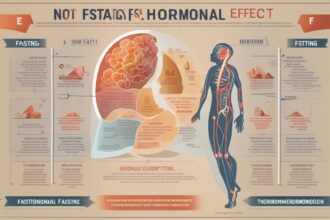Hey there, health enthusiasts! If you’ve ever wondered how fasting impacts your body on a deeper level, you’re in for a treat. Today, we’re diving into the fascinating world of fasting hormones and their profound effects on your physiology. Whether you’re practicing intermittent fasting, extended fasting, or just curious about how skipping a meal or two affects your system, understanding the hormonal shifts can help you optimize your fasting journey. From hunger-regulating hormones to those that boost fat-burning, let’s unpack the science behind fasting and hormones, sprinkle in some practical tips, and explore why this ancient practice is making waves in modern health circles.
What Are Fasting Hormones and Why Do They Matter?
When you fast, your body doesn’t just “wait” for the next meal—it undergoes a complex dance of hormonal changes to maintain energy balance and keep you functioning. Fasting hormones are the chemical messengers that orchestrate this process, adapting your metabolism, appetite, and even mood to the absence of food. These hormones are critical because they determine how efficiently your body burns fat, preserves muscle, and manages stress during fasting periods. Think of them as the conductors of your body’s symphony, ensuring everything plays in harmony when calories aren’t coming in. Research shows that fasting triggers significant shifts in hormones like insulin, ghrelin, and growth hormone, each playing a unique role in your health (Fung & Moore, 2016).
Key Hormones Affected by Fasting
Let’s break down the major players in the realm of fasting hormones. These are the ones you’ll hear about most often in discussions around intermittent fasting and hormonal balance. Each hormone responds differently to fasting, and understanding their roles can help you make informed choices about your fasting routine.
- Insulin: This hormone drops significantly during fasting, which is a good thing! Lower insulin levels signal your body to switch from storing energy to burning stored fat for fuel (Barnard et al., 2019).
- Ghrelin: Known as the “hunger hormone,” ghrelin typically rises during fasting, making you feel hungry. However, with consistent fasting, your body may adapt, reducing hunger pangs over time (Cummings et al., 2002).
- Leptin: This “satiety hormone” decreases during fasting, which can temporarily increase appetite. Long-term fasting practices may improve leptin sensitivity, aiding weight management (Myers et al., 2010).
- Human Growth Hormone (HGH): Fasting boosts HGH levels, which supports fat loss, muscle preservation, and cellular repair—key benefits for overall health (Ho et al., 1988).
How Fasting Hormones Influence Metabolism and Fat Loss
One of the biggest reasons people turn to fasting is for weight loss, and the hormonal effects are a huge part of why it works. When you fast, the drop in insulin allows your body to access stored fat more easily—a process called lipolysis. At the same time, the spike in hormones like norepinephrine and HGH during fasting revs up your metabolism, encouraging your body to burn fat for energy. Studies suggest that intermittent fasting can enhance fat oxidation, especially when paired with a balanced diet post-fast (Tinsley & La Bounty, 2015). This hormonal shift is why many find fasting to be a powerful tool for shedding stubborn pounds. But it’s not just about fat loss—fasting hormones also help preserve lean muscle mass, thanks to elevated HGH, ensuring you’re not sacrificing strength for a slimmer waistline.
That said, it’s not a one-size-fits-all. Your body’s response to fasting and hormones can depend on factors like duration of the fast, your baseline health, and even stress levels. So, while fasting can turbocharge fat loss for many, listening to your body’s signals is key to avoiding overdoing it.
The Impact of Fasting on Stress and Mood Hormones
Ever felt a bit cranky or stressed when you skip breakfast? You’re not alone. Fasting influences stress and mood hormones like cortisol and adrenaline, which can spike as your body adjusts to energy scarcity. This “fight or flight” response is a survival mechanism, helping mobilize energy reserves. However, chronic elevation of cortisol during prolonged fasting or poor fasting practices can lead to fatigue or irritability (Cahill, 2006). On the flip side, fasting has been shown to increase brain-derived neurotrophic factor (BDNF), a hormone-like protein that supports mood and cognitive health, potentially reducing symptoms of anxiety over time.
Balancing these hormonal effects means pacing your fasting. If you’re new to it, start with shorter windows—like a 12:12 intermittent fasting schedule (12 hours fasting, 12 hours eating)—to ease your body into these shifts. Over time, as your hormonal balance during fasting stabilizes, you might notice improved mental clarity and resilience to stress. Pretty cool, right?
Practical Tips to Support Hormonal Balance During Fasting
Now that we’ve covered the science of fasting hormones, let’s talk about how to make fasting work for you without throwing your hormones into chaos. Fasting is powerful, but it’s not a free pass to ignore your body’s needs. Here are some actionable tips to keep your hormonal health in check while reaping the benefits of fasting.
- Start Slow: If you’re new to fasting, begin with shorter fasts (10–12 hours) to allow your hormones to adjust gradually without triggering excessive stress responses.
- Stay Hydrated: Dehydration can mess with hormonal signals, so drink plenty of water, herbal teas, or black coffee during fasting windows.
- Break Your Fast Wisely: Avoid overloading on sugary or processed foods when you eat again, as this can spike insulin and undo some hormonal benefits. Opt for protein and healthy fats instead.
- Monitor Stress: High stress can amplify cortisol spikes during fasting, so incorporate relaxation techniques like deep breathing or light yoga.
- Get Enough Sleep: Poor sleep disrupts hormones like ghrelin and leptin, so aim for 7–9 hours nightly to support your fasting goals.
Potential Risks and Hormonal Imbalances to Watch For
While fasting offers incredible benefits through its impact on fasting hormones, it’s not without potential pitfalls. For some, especially women, fasting can disrupt hormones like estrogen and progesterone if done excessively or without proper nutrition. This might manifest as irregular menstrual cycles or increased fatigue. Additionally, over-fasting or combining fasting with extreme calorie restriction can elevate cortisol to unhealthy levels, potentially leading to hormonal imbalances. It’s also worth noting that individuals with conditions like diabetes or thyroid issues should consult a healthcare provider before starting a fasting regimen, as hormonal responses can vary widely (Barnard et al., 2019).
My advice? Don’t push yourself too hard. Fasting should feel sustainable, not like a punishment. Pay attention to signs like extreme hunger, dizziness, or mood swings—these could indicate that your hormones during fasting are out of whack. Adjust your approach, maybe by shortening fasting windows or ensuring nutrient-dense meals, and always prioritize your well-being over rigid rules.
In wrapping up, the interplay of fasting hormones is a testament to how adaptive and resilient our bodies are. From insulin’s role in fat-burning to HGH’s muscle-sparing magic, fasting triggers a cascade of hormonal effects that can transform your health when done thoughtfully. It’s not just about skipping meals—it’s about harnessing these natural processes to boost metabolism, improve mood, and even enhance longevity. So, whether you’re a seasoned faster or just dipping your toes into intermittent fasting, remember to listen to your body, start small, and support your hormonal health with smart habits. Got questions or personal fasting stories? Drop them in the comments—I’d love to hear how fasting and hormones have played a role in your journey!
References
- Barnard, N. D., Goldman, D. M., Loomis, J. F., Kahleova, H., Levin, S. M., Neabore, S., & Batts, T. C. (2019). Plant-based diets for cardiovascular safety and performance in endurance sports. Nutrients, 11(1), 130. https://doi.org/10.3390/nu11010130
- Cahill, G. F. (2006). Fuel metabolism in starvation. Annual Review of Nutrition, 26, 1-22. https://doi.org/10.1146/annurev.nutr.26.061505.111258
- Cummings, D. E., Purnell, J. Q., Frayo, R. S., Schmidova, K., Wisse, B. E., & Weigle, D. S. (2002). A preprandial rise in plasma ghrelin levels suggests a role in meal initiation in humans. Diabetes, 50(8), 1714-1719. https://doi.org/10.2337/diabetes.50.8.1714
- Fung, J., & Moore, J. (2016). The complete guide to fasting: Heal your body through intermittent, alternate-day, and extended fasting. Victory Belt Publishing.
- Ho, K. Y., Veldhuis, J. D., Johnson, M. L., Furlanetto, R., Evans, W. S., Alberti, K. G., & Thorner, M. O. (1988). Fasting enhances growth hormone secretion and amplifies the complex rhythms of growth hormone secretion in man. Journal of Clinical Investigation, 81(4), 968-975. https://doi.org/10.1172/JCI113450
- Myers, M. G., Leibel, R. L., Seeley, R. J., & Schwartz, M. W. (2010). Obesity and leptin resistance: Distinguishing cause from effect. Trends in Endocrinology & Metabolism, 21(11), 643-651. https://doi.org/10.1016/j.tem.2010.08.002
- Tinsley, G. M., & La Bounty, P. M. (2015). Effects of intermittent fasting on body composition and clinical health markers in humans. Nutrition Reviews, 73(10), 661-674. https://doi.org/10.1093/nutrit/nuv041






